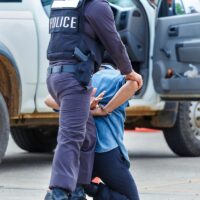What if the Police Refuse Request for Attorney After DWI Arrest

The United States Constitution guarantees citizens the right to due process under the law. Among other things, the Constitution guarantees defendants who have been arrested for a crime the right to be informed of certain constitutional rights. Law enforcement, in turn, must respect those rights. One of the quintessential rights in our democracy is the right to have an attorney present during criminal interrogation. The exact scope of that right is, however, more difficult to identify. Precisely when you are guaranteed the right to an attorney may actually depend upon state law. It’s also important to understand what happens when the police violate your constitutional rights. Below, we discuss your right to an attorney after a DWI arrest and the remedies available to you should law enforcement deny you that right. If you’ve been arrested on suspicion of DWI or DWAI, call a zealous New York DWI defense attorney for seasoned advice and representation.
You Don’t Have the Right to a Lawyer at a Traffic Stop
If you are pulled over on suspicion of driving while intoxicated (DWI), you are required to provide your driver’s license, registration, and proof of insurance upon request of the officer. If you are suspected of drunk driving, the police can request you to take a breath-alcohol test and/or coordination test (field sobriety test). You can refuse to take these tests, but your refusal may serve as evidence against you and the act of refusal is, in itself, a DMV offense. You will likely be arrested upon refusal.
While you are stopped by the police, you have the right not to incriminate yourself. You have the right to remain silent. You can refuse consent to search your vehicle, although the police can search your vehicle without consent under various circumstances. (It’s still helpful to refuse consent, as that may play a role in your eventual criminal defense down the line.) Until you are actually detained and arrested, however, you do not have the unequivocal right to request a lawyer. Simply pulling you over does not trigger your “Miranda rights.” The police can proceed with their routine stop, questions, searches, and even drunk driving tests without waiting for your lawyer to show up.
Once You’ve Been Arrested, You Have the Right to a Lawyer
Once you are taken into custody, you are entitled to your Miranda rights. Those include the right to remain silent, the right to have an attorney present, and the right to know your rights–including being informed that whatever you say can be used against you in a court of law. Your Miranda rights kick in when you are taken into custody–typically, when they put the handcuffs on–and they intend to interrogate you.
In New York, once a defendant has been arrested for DWI, but before they have been formally charged in court, they have a limited right to an attorney. They have the right to consult with counsel, for example, before deciding whether to consent to a chemical BAC test, provided that the defendant explicitly requests the assistance of counsel and there is no danger of delay in administering the test. Police must make a reasonable and sufficient attempt to contact the defendant’s counsel. The limitations on the right are based on the fact that a significant delay can prevent the police from collecting “disappearing” evidence–namely, the alcohol content in your blood that will dissipate over time.
What Happens When the Police Refuse Your Request for a Lawyer
Once you are arrested, you have the right to request an attorney. The police must let you call your lawyer or, if you are in custody and do not know your lawyer’s phone number, they make reasonable efforts to track down a lawyer for you. If you unequivocally request an attorney and your lawyer can be contacted without a “delay in the administration of justice,” the police must acquiesce to your request and let you consult with your lawyer, even before taking a chemical test.
If the police refuse your request for a lawyer, or they fail to make a reasonable and sufficient attempt to contact a lawyer, the police have violated your rights. When the police violate your rights, the evidence they obtain may be tainted. If they refuse your request to talk to a lawyer before taking a chemical test, for example, your lawyer may be able to get the results of that test thrown out of court. If they proceed to interrogate you after you have explicitly requested a lawyer, your answers may be excluded from your prosecution as well. If the government has no legitimately-obtained evidence left to use against you, your case may be dismissed.
Get Help Fighting Hudson Valley DWI Charges
If you have been arrested for DWI, DWAI, or other criminal offenses in New York, call Dupée & Monroe, P.C., to get help from a seasoned criminal defense lawyer. From our offices in Goshen, we represent clients charged with all manner of criminal offenses in Orange County and throughout the Hudson Valley.
